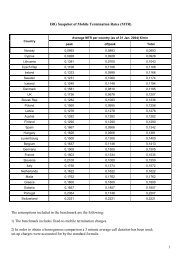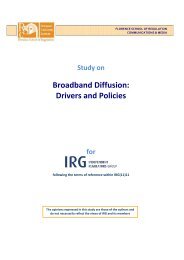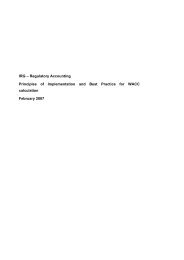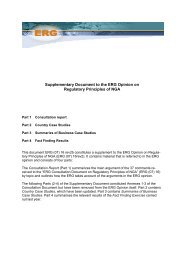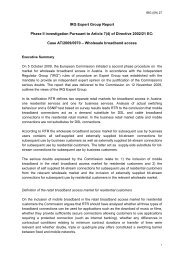- Page 1 and 2:
Annex I to the BEREC Report BoR (11
- Page 3 and 4:
Austria 1 Market developments 1.1 I
- Page 5 and 6:
BoR (11) 06b Further deployment is
- Page 7 and 8:
BoR (11) 06b c) Not included in Mar
- Page 9 and 10:
BoR (11) 06b investment risk? If so
- Page 11 and 12:
BoR (11) 06b Migration costs have t
- Page 13 and 14:
- Current achievements, milestones
- Page 15 and 16:
1.1.2 Announced roll-out plans BoR
- Page 17 and 18:
BoR (11) 06b The following sub-item
- Page 19 and 20:
BoR (11) 06b � non-discrimination
- Page 21 and 22:
� SLA on provisioning & repair. c
- Page 23 and 24:
ADSL(2+) VP-switching VDSL2 WBA sha
- Page 25 and 26:
BoR (11) 06b For the migration from
- Page 27 and 28:
Czech Republic 1 Market development
- Page 29 and 30:
BoR (11) 06b d) Current regulatory
- Page 31 and 32:
3.4 ODF unbundling No wholesale pro
- Page 33 and 34:
BoR (11) 06b information on roll-ou
- Page 35 and 36:
� 10 Mbps for 100 % of households
- Page 37 and 38:
BoR (11) 06b In mid-2010 to about 2
- Page 39 and 40:
2 Wholesale products to reach an ac
- Page 41 and 42:
e) In market 4, the LRAIC pricing m
- Page 43 and 44:
3.3 Cabinet unbundling a) Cabinet u
- Page 45 and 46:
BoR (11) 06b � What is the basis
- Page 47 and 48:
BoR (11) 06b Moreover TDC shall res
- Page 49 and 50:
BoR (11) 06b � Is multi-cast tech
- Page 51 and 52: BoR (11) 06b The alternative operat
- Page 53 and 54: 7 National next generation broadban
- Page 55 and 56: 1.2 Competitors (other telcos, cabl
- Page 57 and 58: 2.2 Dark fibre a) Available on volu
- Page 59 and 60: 3.4 ODF unbundling Not provided. Bo
- Page 61 and 62: BoR (11) 06b required so that compe
- Page 63 and 64: BoR (11) 06b - If relevant, elabora
- Page 65 and 66: Finland 1 Market developments 1.1 I
- Page 67 and 68: 2.1 Duct Access 2.2 Dark fibre 3 Ac
- Page 69 and 70: 3.5 Enhanced Bitstream 1 Below, som
- Page 71 and 72: BoR (11) 06b - How is the informati
- Page 73 and 74: France 1 Market developments 1.1 In
- Page 75 and 76: BoR (11) 06b Progress is made with
- Page 77 and 78: BoR (11) 06b e) Costing (e.g. LRIC,
- Page 79 and 80: 2.2 Dark fibre No offer available.
- Page 81 and 82: BoR (11) 06b � Tariff obligations
- Page 83 and 84: c) Market 5. d) Not applicable. e)
- Page 85 and 86: BoR (11) 06b There is no centralise
- Page 87 and 88: BoR (11) 06b - Main focus of the in
- Page 89 and 90: BoR (11) 06b Telekom Deutschland Gm
- Page 91 and 92: BoR (11) 06b � availability of re
- Page 93 and 94: BoR (11) 06b c) Dark fibre access i
- Page 95 and 96: BoR (11) 06b f) According to actual
- Page 97 and 98: BoR (11) 06b � Telekom Deutschlan
- Page 99 and 100: o obligation of collocation e) Fibr
- Page 101: d) BoR (11) 06b In Market 12: unbun
- Page 105 and 106: BoR (11) 06b To date, there are no
- Page 107 and 108: BoR (11) 06b To take account of dat
- Page 109 and 110: BoR (11) 06b business to invest in
- Page 111 and 112: BoR (11) 06b Measures (below some i
- Page 113 and 114: Greece 1 Market developments 1.1 In
- Page 115 and 116: BoR (11) 06b e) Costing (e.g. LRIC,
- Page 117 and 118: 3.3 Cabinet unbundling N/A. 3.4 ODF
- Page 119 and 120: BoR (11) 06b information on roll-ou
- Page 121 and 122: Hungary 1 Market developments 1.1 I
- Page 123 and 124: BoR (11) 06b d) Current regulatory
- Page 125 and 126: 3 Access products available BoR (11
- Page 127 and 128: BoR (11) 06b Transparency. Unbundli
- Page 129 and 130: BoR (11) 06b According to the draft
- Page 131 and 132: BoR (11) 06b information on roll-ou
- Page 133 and 134: 7 National next generation broadban
- Page 135 and 136: BoR (11) 06b are connected via its
- Page 137 and 138: BoR (11) 06b There are 2 other trip
- Page 139 and 140: 2.2 Dark fibre As per 2.1 duct acce
- Page 141 and 142: 3.5 Enhanced Bitstream 1 The curren
- Page 143 and 144: BoR (11) 06b - Who established/runs
- Page 145 and 146: Television Appendix 1 UPC Retail Pr
- Page 147 and 148: Home Phone Home Phone Price per mon
- Page 149 and 150: 1.4 Ten Year Fibre Licence - Cost p
- Page 151 and 152: e-Net pricing Contd Managed product
- Page 153 and 154:
BoR (11) 06b e-Net SDH Premium Serv
- Page 155 and 156:
Appendix 5 BoR (11) 06b General pri
- Page 157 and 158:
Italy 1 Market developments 1.1 Inc
- Page 159 and 160:
BoR (11) 06b Fastweb has invested,
- Page 161 and 162:
BoR (11) 06b d) Current regulatory
- Page 163 and 164:
BoR (11) 06b d) Current regulatory
- Page 165 and 166:
� Price control, transparency, no
- Page 167 and 168:
BoR (11) 06b with decision 1/11/CON
- Page 169 and 170:
- Which data are collected in this
- Page 171 and 172:
BoR (11) 06b as defined in the MoU,
- Page 173 and 174:
1.2.2 Announced roll-out plans BoR
- Page 175 and 176:
BoR (11) 06b g) Mention any other r
- Page 177 and 178:
BoR (11) 06b � Elaborate on the r
- Page 179 and 180:
- Current achievements, milestones
- Page 181 and 182:
2 Wholesale products to reach an ac
- Page 183 and 184:
BoR (11) 06b g) Mention any other r
- Page 185 and 186:
BoR (11) 06b Legal framework forese
- Page 187 and 188:
6 Symmetrical regulation based on n
- Page 189 and 190:
Malta 1 Market developments 1.1 Inc
- Page 191 and 192:
BoR (11) 06b f) Pricing (e.g. long-
- Page 193 and 194:
BoR (11) 06b � Specify the condit
- Page 195 and 196:
5 Transparency regarding civil engi
- Page 197 and 198:
The Netherlands 1 Market developmen
- Page 199 and 200:
1.2 Competitors (other telcos, cabl
- Page 201 and 202:
3 Access products available BoR (11
- Page 203 and 204:
3.4 ODF unbundling FttH BoR (11) 06
- Page 205 and 206:
3.5 Enhanced Bitstream 1 BoR (11) 0
- Page 207 and 208:
BoR (11) 06b Finally, the incumbent
- Page 209 and 210:
6 Symmetrical regulation based on n
- Page 211 and 212:
� For an additional NOK 10/month,
- Page 213 and 214:
BoR (11) 06b � non-discrimination
- Page 215 and 216:
BoR (11) 06b g) Mention any other r
- Page 217 and 218:
e) Historical costs in the accounti
- Page 219 and 220:
5 Transparency regarding civil engi
- Page 221 and 222:
Poland 1 Market developments 1.1 In
- Page 223 and 224:
BoR (11) 06b a) Available: on a vol
- Page 225 and 226:
BoR (11) 06b � Non-discrimination
- Page 227 and 228:
3.2 Concentration point/ manhole un
- Page 229 and 230:
d) Proposed Market 4 remedies: �
- Page 231 and 232:
d) Proposed Market 5 remedies: �
- Page 233 and 234:
BoR (11) 06b � Elaborate on the r
- Page 235 and 236:
BoR (11) 06b - Are there different
- Page 237 and 238:
BoR (11) 06b efficient sharing of t
- Page 239 and 240:
1.1.2 Announced roll-out plans BoR
- Page 241 and 242:
1.2.2 Announced roll-out plans BoR
- Page 243 and 244:
d) Market 4. e) An effective refere
- Page 245 and 246:
BoR (11) 06b � transparency oblig
- Page 247 and 248:
BoR (11) 06b delivery service” -
- Page 249 and 250:
BoR (11) 06b interconnection”;
- Page 251 and 252:
BoR (11) 06b � Are there any spec
- Page 253 and 254:
BoR (11) 06b � Are there any prov
- Page 255 and 256:
BoR (11) 06b PT‟s duct offer also
- Page 257 and 258:
BoR (11) 06b S.A. -, regulated by A
- Page 259 and 260:
- Current achievements, milestones
- Page 261 and 262:
1.2 Competitors (other telcos, cabl
- Page 263 and 264:
BoR (11) 06b a) Available: on a vol
- Page 265 and 266:
ANCOM didn‟t impose unbundled acc
- Page 267 and 268:
BoR (11) 06b publish details with r
- Page 269 and 270:
BoR (11) 06b Strategy for Broadband
- Page 271 and 272:
Orange SK 42 738 connected / 301 94
- Page 273 and 274:
The following sub-items should be a
- Page 275 and 276:
BoR (11) 06b � Is quality differe
- Page 277 and 278:
BoR (11) 06b - If relevant, elabora
- Page 279 and 280:
1.2 Competitors (other telcos, cabl
- Page 281 and 282:
� Transparency in relation to net
- Page 283 and 284:
d) - e) LRIC. f) LRIC based prices.
- Page 285 and 286:
BoR (11) 06b None yet, fibre was no
- Page 287 and 288:
Below, some additional questions on
- Page 289 and 290:
BoR (11) 06b - Elaborate on your pr
- Page 291 and 292:
7 National next generation broadban
- Page 293 and 294:
1.1.2 Announced roll-out plans BoR
- Page 295 and 296:
BoR (11) 06b a) Available: on a vol
- Page 297 and 298:
BoR (11) 06b d) Current regulatory
- Page 299 and 300:
BoR (11) 06b � What is the basis
- Page 301 and 302:
BoR (11) 06b bitstream access oblig
- Page 303 and 304:
BoR (11) 06b initially expected. Ar
- Page 305 and 306:
BoR (11) 06b All operators that dep
- Page 307 and 308:
- Current achievements, milestones
- Page 309 and 310:
BoR (11) 06b Sweden has got roughly
- Page 311 and 312:
c) Included in Market X BoR (11) 06
- Page 313 and 314:
There are no specific rules for Ftt
- Page 315 and 316:
No such provisions are applied. �
- Page 317 and 318:
Switzerland Summary of the answers
- Page 319 and 320:
BoR (11) 06b Swisscom is rolling ou
- Page 321 and 322:
BoR (11) 06b Network Cablecom & oth
- Page 323 and 324:
BoR (11) 06b a) Available: on a vol
- Page 325 and 326:
BoR (11) 06b f) Pricing (e.g. long-
- Page 327 and 328:
BoR (11) 06b � Please describe th
- Page 329 and 330:
BoR (11) 06b - What are the legal r
- Page 331 and 332:
References BoR (11) 06b [1] BAKOM,
- Page 333 and 334:
1.2 Competitors (other telcos, cabl
- Page 335 and 336:
3 Access products available BoR (11
- Page 337 and 338:
BoR (11) 06b � Please describe th
- Page 339 and 340:
BoR (11) 06b - If relevant, elabora
- Page 341 and 342:
1.2 Competitors (other telcos, cabl
- Page 343 and 344:
BoR (11) 06b a) Available: on a vol
- Page 345 and 346:
BoR (11) 06b from such an obligatio
- Page 347 and 348:
4 Migration issues BoR (11) 06b �
- Page 349 and 350:
BoR (11) 06b - What are the legal r



